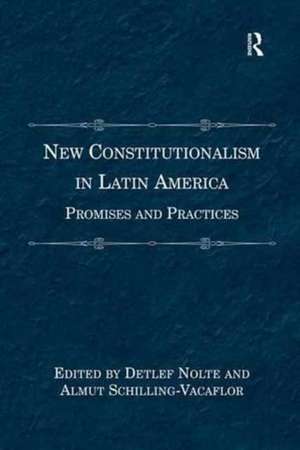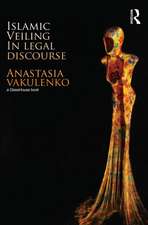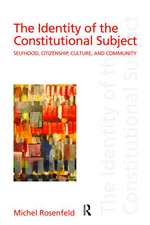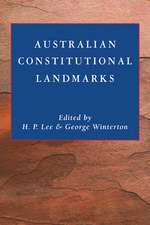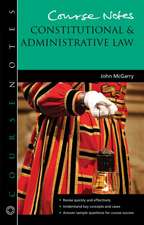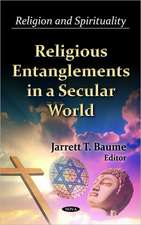New Constitutionalism in Latin America: Promises and Practices
Autor Almut Schilling-Vacaflor Editat de Detlef Nolteen Limba Engleză Paperback – 28 noi 2016
| Toate formatele și edițiile | Preț | Express |
|---|---|---|
| Paperback (1) | 489.26 lei 6-8 săpt. | |
| Taylor & Francis – 28 noi 2016 | 489.26 lei 6-8 săpt. | |
| Hardback (1) | 1072.02 lei 6-8 săpt. | |
| Taylor & Francis – 14 sep 2012 | 1072.02 lei 6-8 săpt. |
Preț: 489.26 lei
Nou
Puncte Express: 734
Preț estimativ în valută:
93.62€ • 98.01$ • 77.46£
93.62€ • 98.01$ • 77.46£
Carte tipărită la comandă
Livrare economică 05-19 aprilie
Preluare comenzi: 021 569.72.76
Specificații
ISBN-13: 9781138271555
ISBN-10: 1138271551
Pagini: 436
Dimensiuni: 156 x 234 x 23 mm
Greutate: 0.45 kg
Ediția:1
Editura: Taylor & Francis
Colecția Routledge
Locul publicării:Oxford, United Kingdom
ISBN-10: 1138271551
Pagini: 436
Dimensiuni: 156 x 234 x 23 mm
Greutate: 0.45 kg
Ediția:1
Editura: Taylor & Francis
Colecția Routledge
Locul publicării:Oxford, United Kingdom
Notă biografică
Detlef Nolte is Vice-President of the GIGA German Institute of Global and Area Studies and Director of the GIGA Institute of Latin American Studies. Dr. Almut Schilling-Vacaflor is a Research Fellow at the GIGA Institute of Latin American Studies, Germany.
Recenzii
'The presence of constitutionalism throughout Latin America since the Independence has affected politics in very different ways. Likewise, presidentialism has been a key feature of the region, albeit with significant variations. This book extensively explores how both aspects shape current politics, describes the so-called "new constitutionalism" in detail, and offers new and important questions for future research.' Manuel Alcántara, Universidad de Salamanca, Spain 'This volume is the most important contribution on Latin American constitutionalism to date. Using an extraordinary diversity of entry points - from historical analysis to legal philosophy, from diffusion approaches to rational choice institutionalism - the authors successfully illuminate the causes and consequences of constitutional choice. Highly recommended for all scholars and students of Latin American politics.' Timothy J. Power, University of Oxford, UK
Cuprins
1: Introduction and Analytical Concepts; 1: Introduction: The Times they are a Changin': Constitutional Transformations in Latin America since the 1990s; 2: Explaining Constitutional Change: Comparing the Logic, Advantages and Shortcomings of Static and Dynamic Approaches; 3: Toward a Theory of Formal Constitutional Change: Mechanisms of Constitutional Adaptation in Latin America; 4: Still the Land of Presidentialism? Executives and the Latin American Constitution; 5: What do we mean when we talk about ‘Critical Constitutionalism'? Some Reflections on the New Latin American Constitutions; 2: Reflections on the New Latin American Constitutionalism from a Historical and Comparative Perspective; 6: Latin American Constitutionalism: Historical Development and Distinctive Traits; 7: Latin American Constitutionalism Then and Now: Promises and Questions 1; 3: Case Studies: The Impact of New Constitutions on Democracy and Governance; 8: Neo-Constitutionalism in Twenty-first Century Venezuela: Participatory Democracy, Deconcentrated Decentralization or Centralized Populism?; 9: New Constitutions and the Transformation of Democracy in Bolivia and Ecuador *; 10: Constitutionalizing Policy: The Brazilian Constitution of 1988 and its Impact on Governance; 11: Change and Continuity in Dominican Constitutions: The 2010 Reform Compared 1; 12: Chile: Democratization through Constitutional Reforms 1; 4: Case Studies: The Empowerment of Courts; 13: Institutional Design and Judicial Behaviour: Constitutional Interpretation of Criminal Due Process Rights in Latin America 1; 14: Constitutional Courts and Constitutional Change: Analysing the Cases of Presidential Re-Election in Latin America *; 5: Case Studies: Rights Revolution and Indigenous State Transformation; 15: Colombia's 1991 Constitution: A Rights Revolution 1; 16: How Does the New Constitutionalism Respond to the Human Rights Challenges Posed by Transnational Corporations?; 17: Plurinational Constitutionalism: A New Era of Indigenous-State Relations?; 18: Turning Legal Pluralism into State-Sanctioned Law: Assessing the Implications of the New Constitutions and Laws in Bolivia and Ecuador; Conclusions
Descriere
Authors from a number of different disciplines offer a general overview of constitutional reforms in Latin America since 1990. They explore the historical, philosophical and doctrinal differences between traditional and new constitutionalism in Latin America and examine sources of inspiration. The book also covers sociopolitical settings, which factors and actors are relevant for the reform process, and analyses the constitutional practices after reform, including the question of whether the recent constitutional reforms created new post-liberal democracies with an enhanced human and social rights record, or whether they primarily serve the ambitions of new political leaders.
